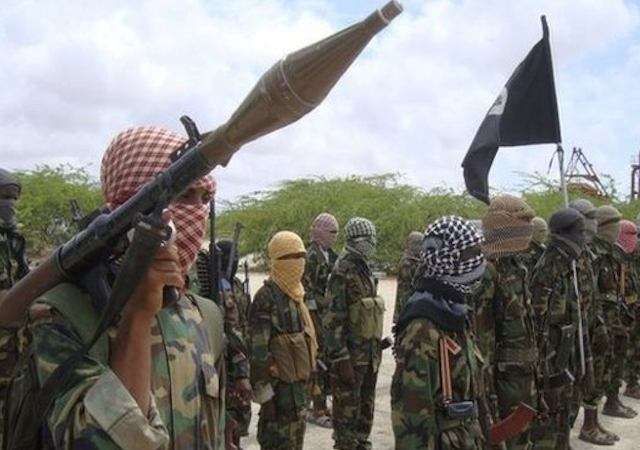Al-Shabaab shake-up hits Somalia
The fractured group is still gaining ground.

Just days after al-Shabaab insurgents attacked an African Union military base in Somalia, one of the group’s leaders has been captured along the Somalia-Kenya border.
From the AP:
A leader with the Islamic extremist group al-Shabab, who had a $3 million bounty on his head, surrendered in Somalia, a Somali intelligence official said Saturday.
Zakariya Ismail Ahmed Hersi surrendered to Somali police in the Gedo region, said the intelligence officer, who insisted on anonymity because he is not authorized to speak to the press.
Hersi may have surrendered because he fell out with those loyal to Ahmed Abdi Godane, al-Shabab’s top leader who was killed in a U.S. airstrike earlier this year, the officer said.
Hersi was one of seven top al-Shabab officials whom the Obama administration offered a total $33 million in rewards for information leading to their capture in 2012. It is not clear if the reward will be paid out for Hersi because he surrendered.
Despite major setbacks in 2014, al-Shabab remains a threat in Somalia and the East African region. The group has carried out many terror attacks in Somalia and some in neighboring countries including Kenya, whose armies are part of the African Union troops bolstering Somalia’s weak U.N.- backed government.
Reports out of Africa have confirmed that the Gashan (Somali special forces) have cleared out the last of the insurgents who attacked the AMISOM base in Mogadishu, but we still have very little information about why Hersi surrendered, or if his surrender had anything to do with Thursday’s attack. Senior military official Col. Abas Ibrahim Gurey told CNN that “Zakariya has told us following his capture that he left Al-Shabaab a year and half ago and since then was looking for to surrender to the Somali government,” but have otherwise been tight lipped about the man’s motives.
After the United States took out former al-Shabaab leader and co-founder Ahmed Abdi Godane in a drone strike earlier this year, the group vowed to avenge Godane and overcome the coalition forces attempting to control the spread of Islamic insurgency in the horn of Africa. This has been a major motivating factor in the group’s actions since September, so hypothesizing that Hersi surrendered as a way out isn’t unreasonable at all, especially if Hersi couldn’t make contact with anyone within the organization who supported and came up with new leader Abu Ubeid Ahmed Omar.
What’s important to remember is that the surrender of one doesn’t necessarily reflect continued fracturing within the group. Earlier this fall, reports out of Uganda (also a coalition member state) suggested that al-Shabaab was becoming active in the region. Although al-Shabaab doesn’t have the media presence or global popularity of al-Qaida or ISIS, we should worry when we see their influence spread. Hersi’s surrender signals that this latest power shift could bode ill for those who had hoped that al-Shabaab would fade into history after drones entered into the equation.
 DONATE
DONATE
Donations tax deductible
to the full extent allowed by law.







